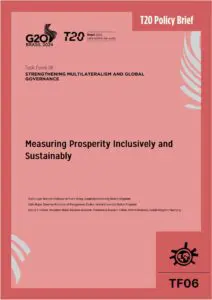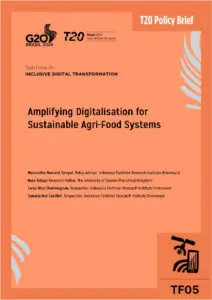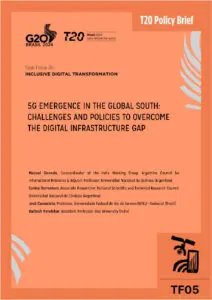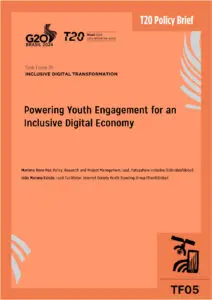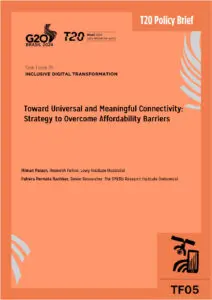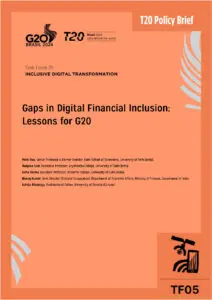In 2019, G20 countries hosted 61 per cent of all international migrants worldwide. Migrants and diasporas are active in supporting the development of their country of origin or heritage. As such, G20 countries have a key responsibility in shaping the global governance of migration and enabling diaspora engagement.
In 2020, COVID-19 has put to the test the capacity of diasporas to connect with, and support, their families and communities at home. However, the pandemic has also shown the resilience, solidarity, reaction capacity and creativity of these communities, and pointed to the way ahead in terms of innovative solutions, especially in the digital sphere and transfer of knowledge.
The G20 has a key role to play. It should: (a) stress the importance of diasporas for development, emphasising its support for existing and future global and regional initiatives aimed at facilitating international dialogue and partnership on migration; (b) collaborate with the G7, relevant international organisations and other stakeholders to support innovative ways to further reduce the cost of sending remittances; and (c) make an explicit commitment to bolstering global and regional forums and initiatives for dialogue on migration governance.
Challenge
COVID-19 has put to the test the capacity of diaspora communities and their organisations to continue to foster the development of their countries of origin or heritage. Reduced employment opportunities and wages in destination countries have put downward pressure on outward financial flows, and in particular remittances, which provide crucial income support to households (and, indirectly, governments) in countries of origin or heritage. At the same time, the transfer of social and human capital has been hampered by a context of severely restricted international mobility like no other in decades.
This combination of factors risks compounding the effects of an already deep global economic crisis that is having asymmetric effects on the poor and the disadvantaged, widening inequalities. At the same time, COVID-19 and non-pharmaceutical interventions such as lockdowns have accelerated the shift towards innovative services for diaspora communities, especially in the digital realm, and have shown the resilience of longstanding relationships between diasporas and their families, relatives and larger social networks “back home”.
Meanwhile, the pandemic has made destination countries increasingly aware of the importance of “essential workers”, who serve critical functions in European societies, as involuntary immobility reduces the efficiency of domestic labour markets. However, it has also led to increased stigmatisation and discrimination against migrants, and the diasporas have played a crucial role in addressing these issues and promoting a positive narrative on migrants. The absence of regular migration channels during lockdowns and border closures has forced destination countries to resort to different policy solutions there as well, through regularising (at least temporarily) a share of undocumented migrants already living within their borders, or by implementing policies aimed at facilitating their arrival even as borders remained much more strictly regulated for other categories.
The recognition of related and complementary needs between origin and destination countries may help the two groups acknowledge the need for deeper cooperation on migration governance. Countries may be more willing to work together in streamlining current activities, and to acknowledge the need for a sounder and more structured regional dialogue (and for stronger, more practical engagement of diaspora organisations at the regional level as well).
Pandemic-related challenges to diaspora communities as well as host and origin countries raise the need for increased dialogue and collaboration in international contexts that involve diaspora organisations. However, at the international and regional level, such forums and initiatives are not yet fully operational, or need reforms to make them fit to navigate a shifting operating environment. At the design, planning and implementation levels, diaspora engagement often remains strictly tied to bilateral relations, with one host and one origin country at its core. While initiatives at the regional level appear to be on the rise, especially in the European Union and the African Union, political declarations are not automatically followed by actual programmes on the ground.
Proposal
In 2020, 281 million people lived outside their country of origin, and a good share of them are active in supporting, either directly or indirectly, the development of their country of origin. At the political and civil society level, awareness of the role of diasporas in fostering positive development outcomes has been growing over the past few decades. However, policy initiatives at the global, regional and country level are still scattered and with little interconnection.
G20 countries host 166 million migrants, or 59 per cent of all international migrants worldwide. Moreover, out of a total USD 447 billion in remittances globally, 71 per cent originated from G20 countries. This amounts to close to USD 320 billion, which is almost twice as large as the USD 168 billion in net official development assistance and official aid that was provided to low-and-middle-income countries in 2019. As such, G20 countries in coordination with origin countries have a key responsibility in shaping global migration governance and, in particular, creating enabling conditions for diaspora engagement. However, in its most recent final leaders’ declaration (G20, 2020), migration is cited only in one paragraph, and only in reference to efforts to “mitigate the impact of the pandemic of those in vulnerable situations” and “address the root causes of displacement”.
In 2020, COVID-19 has put to the test the social and economic capacity of the diaspora community to connect with, and support, their families and acquaintances at home. The impact has been widespread, ranging from the reduced frequency of contacts and travel/exchange opportunities (which call for alternative solutions in order to sustain the transfer of social and human capital; OECD, 2020), to wage reduction and increases in inequalities (which appear to have compressed the extent of remittances, as well as possibilities for return investment). However, some diaspora communities have proven resilient, developing transnational innovative and quick-reaction responses to support migrant communities in host countries, shifting their relationships with countries of origin or descent increasingly towards the digital realm, and showing in very concrete and pragmatic terms that their role in countering the economic recession and supporting vulnerable migrants is vital (IOM, 2020; African Union, 2021). Yet, diasporas do not always receive the necessary recognition and acknowledgement by governments in both host and origin countries for their involvement and contributions, which leads to mistrust and weakened cooperation structures.
Recommendation 1. In its final communiqué, the G20 should stress the importance of diasporas for development and humanitarian action. It may also stress the importance of migrant integration in host countries, and the facilitation of circular migration as a way to transfer skills and experiences. The G20 should also emphasise its support for existing and future global and regional initiatives aimed at facilitating international dialogue on migration.
Recent data suggests that, in 2020, remittances declined by just 2.4 per cent: while this was a stark reversal compared to the 5.4 per cent compound annual growth rate that they had enjoyed between 2009 and 2019, the drop was still much lower than expected, raising an interesting debate with wide policy implications. In April 2020, the World Bank expected a 20 per cent contraction year-on-year, and at the start of 2021 the extent of the decline was estimated at around 7 per cent, before being revised further (World Bank, 2020a; EIU, 2021; World Bank, 2021). At the same time, stark regional disparities are starting to appear, with strong growth in remittances to Latin America and Caribbean countries (+6.5 per cent in 2020) being countered by a drop of 12.5 per cent to Sub-Saharan African countries (larger than any regional drop in remittances since at least the Great Recession in 2007-2009). Some have speculated that the smaller-than-expected reduction could be due to a number of factors: for instance, those migrant workers who send large sums home might also be less prone to job loss, while migrants making less money, and working in the informal sector, might have been hit disproportionately but contribute less to the grand total in remittances; or, migrants might have been more likely to send (more) money home than expected as they acknowledged the severity of the economic crisis in their home countries (Mughogho, 2020).
An interesting possibility is that this reduced drop reflects, at least partly, a diversion of remittances from informal towards formal channels. This would be due to the difficulty of carrying money by hand during lockdowns and under travel restrictions, and the disruption of informal channels such as the hawala system, whereby cash changes hands while remaining in large part within the destination and host countries (and then, when the sum is moved abroad in order to regulate informal settlements, it is not counted as remittances but as bank transfers; Aneja and Etter, 2021). COVID-related shifts and disruptions have also led to growth in existing and novel digital solutions, such as digital wallets, in enabling international cash transfers, so much that even large incumbents have been expanding their digital business: in 2020, digital revenues represented 21 per cent of Western Union’s consumer business, up from 14 per cent the previous year (Western Union, 2021).
In this respect, the pandemic should not only be seen as a crisis, but also as having opened up a window of opportunity to modernise how remittances work in practice, by accelerating their shift from informal to formal channels, as well as their movement from traditional (over-the-counter, cash-in/cash-out) to increasingly digital transfers. This is one of the reasons why the attention of international policymakers is increasingly focusing on remittance infrastructure.
One benefit of fostering the creation, development and modernisation of remittance infrastructure is an increase in competition between market actors. This in turn helps bring down the cost of remittances, supporting the disposable income of both senders and receivers, while also encouraging the shift towards the use of formal channels. Currently, the global average cost of remittances hovers at between 6.5 per cent and 7 per cent (World Bank, 2020b). The average is down compared to the 10 per cent estimated in 2011, but the decline has decelerated over the past few years and is at risk of having plateaued. Yet, the 6.5 per cent figure is still a way off from the 2009 “5 by 5” set by G8 countries, aiming at halving the cost of remittances from 10 per cent to 5 per cent in five years, i.e., by 2014. It is also further away from the 2030 Sustainable Development Goal of reducing transaction costs to less than 3 per cent.
The disruptive role of digital players is evident in the fact that, already today, sending digital remittances costs systematically less than doing so via traditional (formal) channels: although they still averaged a cost of 5.2 per cent in 2020, digital methods to send remittances cost less than the 6.5-7 per cent figure reported earlier for traditional remittances. Unfortunately, a clear limit to digital services and solutions is financial inclusion, both in host and origin countries. Better regulated and more competitive markets, wider access to digitally enabled devices (coupled with more stable connections and consistent and widespread coverage), and more interoperable remittance infrastructure at the international level may contribute to further bringing down costs, by increasing competitiveness among market players and, as importantly, by raising awareness among diaspora communities of the availability of viable alternative services/channels.
Recommendation 2a. The G20 should collaborate with the G7, relevant international organisations and other stakeholders to support innovative ways to further reduce the cost of sending remittances (e.g., through digital payments and bank services), better regulating the remittances markets and fostering more competition among service providers.
The G20 may also set up novel initiatives in collaboration with origin countries to explore ways to further mobilise diasporas’ savings (for instance through “diaspora bonds”). It should also encourage countries and international organisations to raise awareness among diaspora communities of novel ways to reduce the costs of international financial transfers.
Recommendation 2b. Apart from financial flows, the G20 should explicitly back the movement of people across borders, especially between home and host countries (“circular migration”). The pandemic has proven how fragile international movement can be, and a number of safety and health measures will need to remain in place. But the G20 should explicitly recognise that higher diaspora mobility can foster the transfer of skills and human capital, and potentially contribute to a better matching between the needs of destination countries and would-be migrants in origin countries.
Diasporas can play an important role in fostering development in homelands. Apart from remittances, the active role of diasporas can also contribute to direct investment in origin countries, and to transferring knowledge, norms, practices, skills and human capital through returning on a short or long-term basis, or through other exchanges. From the outset of the pandemic, diaspora communities have been playing a role front and centre to address impacts and support fellow nationals abroad and communities at home by engaging in awareness-raising activities, transfer of know-how (e.g., medical staff), provision of equipment, etc.
Such role can be enhanced when diasporas gather in more formal organisations: diaspora organisations tend to have a higher capacity to act than individuals, and they will likely have better access to institutions and a higher capacity to attract and mobilise funds, engage with their community and encourage the emergence and exchange of new ideas in host and/or origin countries. At the political level, it is therefore key to further develop policies to engage diasporas in development, increasing their coherence, coordination and long-term sustainability; and/or to set up national institutions dedicated to hearing and collecting the needs of diasporas.
Over the past decade, the world has witnessed a boom in diaspora institutions, as more host and origin countries have recognised their role in development. As per a recent exercise conducted by the European Union Global Diaspora Facility (implemented by the International Centre for Migration Policy Development), out of 107 home countries mapped, 66 have diaspora institutions, and 24 have official diaspora engagement policies (EUDiF, 2021). While increased institutionalisation of diaspora matters is welcome, much still needs to be done to address the fragmentation of diaspora engagement, especially for development purposes. At the design, planning and implementation levels, diaspora engagement often remains quite strictly tied to bilateral relations, with one host and one origin country at its core. While initiatives at the regional level appear to be on the rise, especially in the EU and the African Union (AU), political declarations do not always result in actual programmes on the ground.
For instance, almost a decade ago, in 2012, the AU hosted the Global African Diaspora Summit, in which 64 heads of state endorsed the Sandton Declaration. In the Declaration, AU governments recognised diasporas as a “sixth region” of Africa and encouraged diasporas “to organize themselves in regional networks and establish appropriate mechanisms that will enable their increasing participation in the affairs of the African Union” (African Union, 2012). However, to this day unequal progress has been recorded on the legacy initiatives that originated from the Declaration. In Africa, diaspora engagement tends to remain limited to the national or bilateral level and, if and when it is pushed up to the regional (AU) level, it is often seen as only symbolic (Tittel-Mosser, 2021).
One reason for this can likely be attributed to the fact that diaspora engagement at the national level, in many countries, remains limited and fragmented as well, thus not resulting in a conducive environment for initiatives at the regional level. For instance, the results of the Diaspora Engagement Self-Assessment tool showed that in 2019, out of 11 African countries that submitted self-assessments, less than half recorded a score higher than 2 out of 4 (AU 2019). However, this should not discourage scholars from making the case for better and stronger regional coordination, and for policymakers to make their best efforts to act on that advice. One good example is the Rabat Process which brings together 57 countries from Central, West and Northern Africa and Europe and which features discussions and exchanges on, inter alia, various diaspora-related matters and policies.
In particular, regional initiatives should be leveraged to maximise the chances of skill transfer and dissemination (and, hopefully, take-up) of relevant practices among and within institutional actors and diaspora organisations. Regional initiatives could continue to support the currently ongoing “race to the top”, as national actors and institutions compete with their peers to demonstrate their political willingness to maximise the benefits of diaspora engagement, and the capacity to do so in a well-structured and efficient manner.
Here again, we see a window of opportunity originating from the pandemic. For countries of origin and heritage, there is a need to support the flow of remittances, to build more trust,
to enhance conducive environments and initiatives for a more meaningful engagement, and to maintain stronger links and more targeted communication with their diaspora communities at times of lower international travel. For host countries, there is a need for essential migrant workers and for better skill matching, also in view of supporting the ongoing economic recovery in both host and origin countries. The recognition of these two related and complementary needs may more closely align the interests of origin and host countries, thus further opening up avenues for collaboration. Countries recognising the need for stronger cooperation on migration governance, in turn, may be more willing to work together in streamlining current activities, and to acknowledge the need for stronger regional dialogue (and for stronger, more practical engagement of diaspora organisations at the regional level as well).
Through the careful assessment of the abilities, needs and willingness of diaspora communities and organisations, governments and private actors (in particular, NGOs and the business community) could benefit from a higher degree of clarity on which diaspora organisations are the best fit for new projects and initiatives for development. Diasporas are heterogeneous, and there is a mosaic of diaspora organisations across the world that needs to be constantly mapped and reached out to. It is also critical to recognise that persons making up “diasporas” are a diffuse group (in terms of profile, motives, interests, capacities and skills, etc.), hence requiring segmentation and tailoring when putting in place policies and programmes. However, once selected and invested in, well-structured and well-connected diasporas and their organisations are expected to play a bigger role in development, especially if supported by international, regional and national initiatives that select and train, empower and fund the most promising organisations.
Recommendation 3. The G20 should make an explicit commitment to bolstering global and regional forums and initiatives for dialogue on migration governance. In particular, it should stress the importance of existing and novel initiatives that connect diasporas and their organisations to policymakers, the business community and other private actors (e.g., NGOs) in countries of origin and destination.
The G20 should also support and recognise current and new initiatives aimed at engaging diaspora communities and their organisations, compiling and disseminating good practices, fostering multi-stakeholder dialogues at the regional and global level, piloting innovative projects and supporting a balanced narrative on the role of diasporas in development.
REFERENCES
African Union (2012), Declaration of the Global African Diaspora Summit, Sandton, Johannesburg, South Africa, 28 May
African Union (2019), Diaspora Engagement Self-Assessment, September
African Union (2021), Mapping Study on the Role and Faces of African Diaspora Humanitarianism during COVID-19, March
Aneja, Amil; and Bettina Etter (2021), “The Pandemic May Change Remittances – for the Better”, in Foreign Policy, 8 February
EIU (2021), Covid-19 and Remittances: A Hidden Crisis Looming?, February
EUDiF (2021), Snapshot: Institutionalisation of Diaspora Engagement, February
G20 (2020), Leaders’ Declaration, G20 Ryadh Summit, 22 November
IOM, Global Diasporas Reacting to the COVID Crisis: Best Practices from the Field, 2020
Mughogho, Tamara (2020), De-mystifying the Effects of COVID-19 on Remittances, 8 December
OECD (2020), International Migration Outlook, October
Tittel-Mosser (2021), “Diaspora Engagement: Africa”, in EUDiF Regional Series (April)
Western Union (2021), Fourth Quarter / Full Year 2020 – Earnings, 10 February
World Bank (2020a), “Covid-19: Remittances Flows to Shrink by 14% by 2021”, 29 October
World Bank (2020b), “Remittance Prices Worldwide Quarterly”, No. 36, December
World Bank (2021), “Resilience: COVID-19 Crisis through a Migration Lens”, in Migration and Development Briefs, No. 34 (May)



